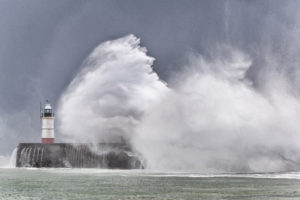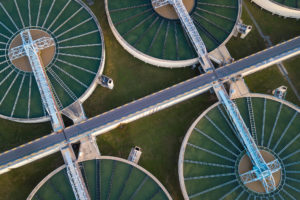5 major trends impacting the Water industry in the next decade
The Water Industry is set to embrace several changes in the coming years due to rapid urbanisation, severe climate changes, rising customer demands and emerging digital technologies. These changes will present businesses with a complex set of challenges that could be worth addressing in order to stay competitive within the industry.
Can such challenges be turned into opportunities that benefit businesses, customers and the environment? We think yes. We highlight five scenarios and opportunities likely to have an impact on the Water Industry in the next decade.
1. Acting on the mounting effects of extreme weather events
 Most effects of climate change are related to water in one way or another. Changes in climate affect agricultural production, contribute to sea level rise, trigger wildfires, and bring about drought and flood events. For example, with more than half of the world’s population living within 200 km of the coast by 2050, sea level rise and extreme storm surges will affect coastal communities to a large extent. Hard engineering structures such as seawalls, dikes and levees can be built to protect coastal communities against severe future flooding, but the use of sophisticated water modelling technologies can help determine current vulnerabilities and suggest effective solutions to better address these coastal challenges.
Most effects of climate change are related to water in one way or another. Changes in climate affect agricultural production, contribute to sea level rise, trigger wildfires, and bring about drought and flood events. For example, with more than half of the world’s population living within 200 km of the coast by 2050, sea level rise and extreme storm surges will affect coastal communities to a large extent. Hard engineering structures such as seawalls, dikes and levees can be built to protect coastal communities against severe future flooding, but the use of sophisticated water modelling technologies can help determine current vulnerabilities and suggest effective solutions to better address these coastal challenges.
2. Protecting agricultural production
 According to the UN, the world’s population is expected to reach more than nine billion people in 2050. To make sure there is enough food for everyone, it is estimated that global food production needs to be increased by 70%. This requires more arable land for crop production, with more extensive and efficient irrigation. All of this will challenge water resources and ecosystems. In order to be sustainable, efficient irrigation management and techniques such as erosion risk management, flood warning systems and precision farming systems can be used to optimise agricultural production using the least amount of water.
According to the UN, the world’s population is expected to reach more than nine billion people in 2050. To make sure there is enough food for everyone, it is estimated that global food production needs to be increased by 70%. This requires more arable land for crop production, with more extensive and efficient irrigation. All of this will challenge water resources and ecosystems. In order to be sustainable, efficient irrigation management and techniques such as erosion risk management, flood warning systems and precision farming systems can be used to optimise agricultural production using the least amount of water.
3. Reusing wastewater to support a circular economy
 Traditional investment, planning, design and operation are linear in nature. Water is extracted from the source, checked for quality, used as intended and then treated and discharged in a receiving water body. However, wastewater and its discharged sludge contains a great number of valuable resources such as nitrogen, phosphorus, energy and other nutrients that can be recovered and reused in a circular economy to preserve threatened resources. By transitioning from a linear model to a more circular one, focus is placed on reducing water consumption and to achieve the overall objective of resource efficiency. Achieving this objective will require businesses to rethink traditional wastewater treatment models.
Traditional investment, planning, design and operation are linear in nature. Water is extracted from the source, checked for quality, used as intended and then treated and discharged in a receiving water body. However, wastewater and its discharged sludge contains a great number of valuable resources such as nitrogen, phosphorus, energy and other nutrients that can be recovered and reused in a circular economy to preserve threatened resources. By transitioning from a linear model to a more circular one, focus is placed on reducing water consumption and to achieve the overall objective of resource efficiency. Achieving this objective will require businesses to rethink traditional wastewater treatment models.
4. A customer-led revolution
 Today, consumers are more than ever empowered by digital technology. As a result, they continuously expect more personalised products and services to optimise their work, improve their way of life and help them reach their goals. To meet these expectations, businesses must deal with the reality of an empowered customer. In this customer-led landscape, the Water Industry is continuously challenged to examine how to co-create solutions with customers. When this is achieved, there will be good opportunities for establishing long-term customer relationships while solving challenges within the water domain.
Today, consumers are more than ever empowered by digital technology. As a result, they continuously expect more personalised products and services to optimise their work, improve their way of life and help them reach their goals. To meet these expectations, businesses must deal with the reality of an empowered customer. In this customer-led landscape, the Water Industry is continuously challenged to examine how to co-create solutions with customers. When this is achieved, there will be good opportunities for establishing long-term customer relationships while solving challenges within the water domain.
5. Smart and intelligent network technologies
 Smart water network solutions improve the reliability of physical water infrastructure by collecting and analysing data more efficiently. The use of Internet of Things (IoT) devices and data analytics not only help to better manage infrastructure and reduce non-revenue water losses, but also support important changes to the ways in which water utilities and companies operate. Smart end-to-end water networks offer businesses the opportunity to improve productivity and efficiency while enhancing customer service.
Smart water network solutions improve the reliability of physical water infrastructure by collecting and analysing data more efficiently. The use of Internet of Things (IoT) devices and data analytics not only help to better manage infrastructure and reduce non-revenue water losses, but also support important changes to the ways in which water utilities and companies operate. Smart end-to-end water networks offer businesses the opportunity to improve productivity and efficiency while enhancing customer service.
DHI continuously solves water related issues by turning challenges into opportunities and solutions.

